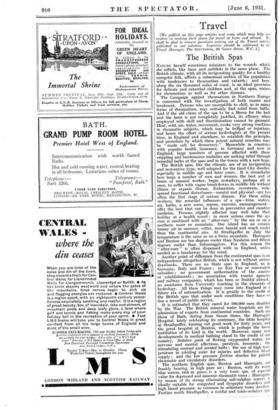Travel
[We publish on this page articles and notes which may help our readers in making their plans for travel at home and abroad. We shall be glad to answer questions arising out of the Travel articles published in our columns. Inquiries should be addressed to the Travel Manager, The SPECTATOR, 99 Gower Street, W.C. 1.]
The British Spas
NATURE herself sometimes ministers to the wounds which she inflicts, like bane and antidote in the same place. The British climate, with all its invigorating quality for a healthy energetic folk, afflicts a subnormal section of the population with tendencies to rheumatism and catarrh;" and here, along the six thousand miles of coast, is an ideal provision for delicate and catarrhal children and, at the spas, waters for rheumatism as well as for other diseases.
The Campaign against rheumatism in Northern Europe is concerned with the investigation of both causes and treatment. Persons who are susceptible to chill, as in many forms of rheumatism, may certainly find relief from baths. And if the old- claim of the spa to be a Mecca for the halt and the lame is not completely justified, its efficacy when employed with skill and discrimination cannot be gainsaid. Heat, cold, air, water, movement, evoke very strong reactions in rheumatic subjects, which may be helfpul or injurious, and hence the effort of serious hydrologists at the present time, in England and elsewhere, to establish the principles and procedure by which these potent natural remedies may be " made safe for democracy." Meanwhile in countries with popular health insurance, in Germany and now in England, large numbers of persons affected with these crippling and burdensome maladies are seeking relief through remedial baths at the spas and in the towns with a new hope. The British spas, like the climate, are of an • invigorating and restorative type, well adapted for the tired City dweller, especially in middle age and later years. It is remarkable how large a number of men and women, the best sort of brain or - manual worker, begin nowadays, perhaps all at once, to suffer with vague breakdowns in middle life without illness or organic disease. Exhaustion, overstrain, wide- spread functional disturbance—mental and physical—are too often the first stage of serious disease. For these ailing workers, the remedial influences of a spa—time, waters, air, baths, a new scene, repose, exercise, encouragement— offer the best that can be done in preventive and curativt medicine. Persons slightly affected may well take theh holiday at a health resort : in more serious cases the spa cure is combined with an " after-cure " by the sea or on a northern moor or mountain. Our island has an oceanic breezy air in summer, softer, more humid and much cooler than the continental airs. At Strathpeffer in July the temperature is the same as on a Swiss mountain. Harrogate and Buxton are ten degrees cooler than Nauheim and fifteen degrees cooler than Salsomaggiore. For this reason the " after-eure " is often dispensed -with in England, unless needed as a breakaway for the mind.
Anothei point of difference from the continental spas is an independence altogether British, which is not without serious drawbacks. There are no State spas in England, as in Germany, Italy and France ; no Kur Tax or convenient subsidies; government authorization of the sources or estabishments ; no association with tourist agencies and railway companies, which has been so fruitful abroad ; no assistance from University teaching in the elements of hydrology. All these things may come into England in a future era of rationalization. It is greatly to the credit of the British spas that under such conditions they have so fine a record of public service.
It is estimated that they cared for 100,000 men disabled by the War. The British mineral water hospitals are the admiration of experts from continental countries. Such arc those of Bath, dating from Saxon times, the Harrogate Hospital, lately celebrating its centenary, the little hospital at Strathpeffer, turning out good work for forty years, and the great hospital at Buxton, which is perhaps the finest institution of its kind in the world. Moreover, many new developments in medical bathing stand to the credit of our
country. Sedative pools of flowing oxygenated water, for nervous and mental affections, paralysis, insomnia ; the stimulating contrast and aerated baths ; the use of high tem- perature in whirling water for injuries and defective blood supply ; and the low pressure friction douches for painful rheumatic and circulatory disorders.
The northern English spas, Buxton and Harrogate, are
frankly bracing, in high pure air ; Buxton, with its warm blue waters, rich in gases, is a very tonic spa, of especial value for depressed and anaemic rheumatic cases ; Harrogate. by reason of its strong eliminating salt-sulphur waters, is ideally suitable for congested and dyspeptic disorders and high blood pressure, so common in sedentary town dwellers. Further north Strathpeffer, a restful and tonic-sedative spa,
with a sulphur water of uncommon strength, has a good reputation for some types of arthritis and gout and for the nervous and circulatory breakdowns of middle life. The Bridge of Allan in Stirlingshire, reopened in October of last year, is another quiet spa, sheltered and sunny, for all seasons, with waters of much service in digestive troubles and salt baths for rheumatic cases.
Further south, Woodhall Spa, with its easterly location and iodide-salt waters, is helpful in many rheumatic and catarrhal cases requiring an invigorating cure. In the Midlands are three interesting places. Droitwich offers a highly stimulating form of external treatment, which has proved of considerable value in chilly climates. The strong brines excite the circulation and the nervous apparatus of the skin, and so indirectly affect the whole body. The Royal Leamington Spa has salt waters more suitable for internal use, with a fine and modern bath establishment. At Cheltenham one may be treated for dyspepsia, liver disorders and acidity. The climate of these Midland places is much warmer and more sedative than that of the Northern Spas.
A little group of sulphur and saline waters in mid-Wales is headed by Llandrindod Wells, on a pleasant upland plateau, in moorland air. The waters and climate are well suited for those who need a mild eliminative cure and nervous repose. The uncommon sulphur waters of Llanwrtyd are excellent for skin affections. Mention must also be made of Trefriw, in the Vale of Conway, a new addition to the ranks of the British spas. Here are some potent and unusual iron waters and acid-iron baths, beneficial for anaemia and convalescence and for arthritis in pale and debilitated persons.
Last, but not least, is the great spa of the West, Bath, with hyperthermal waters famous since Roman times and served in admirable thermal establishments. These waters may be visited at all seasons, but especially in the colder months of the year, for circulatory disturbances, paralysis, injuries, rheumatism and other maladies of age.
There are special waters and methods, both internal and external, that are not at present—or cannot be—available in England. We have, for example, no natural hot muds. It may be- added that the British places, besides their general invigorating action and special value in middle life, are of much benefit to tropical invalids. The disorders of later life that cannot always be removed are often allayed or arrested by recourse to the Northern spas in summer or to the Midlands or the West in winter.







































 Previous page
Previous page